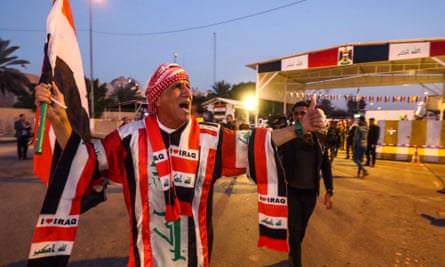Iraq has begun removing cement walls from areas surrounding its capital’s most fortified enclave, opening parts of the so-called Green Zone to traffic in a symbolic move coinciding with nationwide celebrations to mark the anniversary of the country’s costly victory over Islamic State.
The partial reopening of parts of the high-security area is intended to portray increased confidence in the country’s overall security situation and has also been billed as an act of transparency following protests against corruption and poor public services.
The enclave on the west bank of the Tigris became home to foreign embassies and key government buildings after the US-led invasion of 2003 and has since then been surrounded by blast walls and barbed wire, inaccessible to most Iraqis.
The partial reopening of some side streets – initially just for five hours a day – has been repeatedly delayed and then timed to coincide with the one year anniversary of Iraq’s victory over Isis.
The group has lost virtually all the territory it once held but still carries out sporadic attacks to hang on to its last enclave in Syria near the Iraqi border.

The government declared victory last December after a grueling three-year war in which tens of thousands of people were killed and hundreds of thousands displaced. Entire towns and neighbourhoods were reduced to rubble in the fighting.
Monday was declared a national holiday and a moment of silence was held at midday. Checkpoints in the capital were decorated with Iraqi flags and balloons, as security forces patrolled the streets playing patriotic music.
“That victory and the relative stability in security is a golden opportunity for the government to rebuild the country and to meet the needs of its people,” said Sameer al-Obaidi, who led an initiative in the capital’s Sunni-dominated northern Azamiyah neighborhood to distribute flowers to security forces at checkpoints.
“It is important to treat all Iraqis equally so that they feel that their sacrifices are appreciated,” al-Obaidi added.
The celebrations took place amid political infighting over the formation of the government and setting next year’s budget.
Isis, which traces its roots back to the insurgency that followed the 2003 US-led invasion, swept into Iraq from neighbouring Syria in the summer of 2014. It carved out a self-styled caliphate across a third of both countries, imposing a harsh form of Islamic rule and massacring its opponents.
Iraqi forces aided by a US-led coalition eventually drove the group out, including in the climactic battle for Mosul, the country’s second-largest city.
